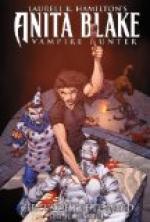But, none the less, he was sentenced to a lifer, and, the mask of John Ward being torn from him, he was sent to Sheffield to stand his trial as Charles Peace. The leap from the train is already recorded; and at his last appearance in the dock he rolled upon the floor, a petulant and broken man. When once the last doom was pronounced, he forgot both fiddle and crowbar; he surrendered himself to those exercises of piety from which he had never wavered. The foolish have denounced him for a hypocrite, not knowing that the artist may have a life apart from his art, and that to Peace religion was an essential pursuit. So he died, having released from an unjust sentence the poor wretch who at Whalley Range had suffered for his crime, and offering up a consolatory prayer for all mankind. In truth, there was no enemy for whom he did not intercede. He prayed for his gaolers, for his executioner, for the Ordinary, for his wife, for Mrs. Thompson, his drunken doxy, and he went to his death with the sure step of one who, having done his duty, is reconciled with the world. The mob testified its affectionate admiration by dubbing him ‘Charley,’ and remembered with effusion his last grim pleasantry. ‘What is the scaffold?’ he asked with sublime earnestness. And the answer came quick and sanctimonious: ‘A short cut to Heaven!’
III—A PARALLEL
(Deacon Brodie and Charles peace)
Not a parallel, but a contrast, since at all points Peace is Brodie’s antithesis. The one is the austerest of Classics, caring only for the ultimate perfection of his work. The other is the gayest of Romantics, happiest when by the way he produces a glittering effect, or dazzles the ear by a vain impertinence. Now, it is by thievery that Peace reached magnificence. A natural aptitude drove him from the fiddle to the centre-bit. He did but rob, because genius followed the impulse. He had studied the remotest details of his business; he was sternly professional in the conduct of his life, and, as became an old gaol-bird, there was no antic of the policeman wherewith he was not familiar. Moreover, not only had he reduced house-breaking to a science, but, being ostensibly nothing better than a picture-frame maker, he had invented an incomparable set of tools wherewith to enter and evade his neighbour’s house. Brodie, on the other hand, was a thief for distraction. His method was as slovenly as ignorance could make it. Though by trade a wright, and therefore a master of all the arts of joinery, he was so deficient in seriousness that he stole a coulter wherewith to batter the walls of the Excise Office. While Peace fought the battle in solitude, Brodie was not only attended by a gang, but listened to the command of his subordinates, and was never permitted to perform a more intricate duty than the sounding of the alarm. And yet here is the ironical contrast.




